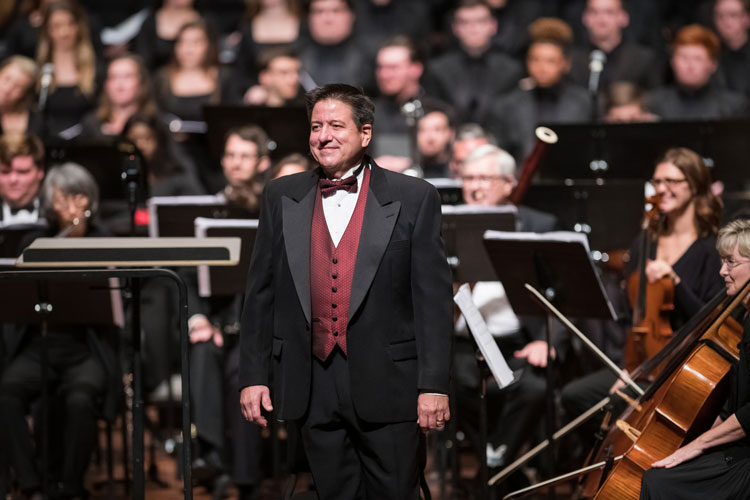
Anonymous donor funds UM symposium to revive music of earlier era
A Renaissance music renaissance is coming to the University of Mississippi.
Thanks to a gift provided by an anonymous donor, a symposium in summer 2020 will bring the enchanting, but seldom-performed music of the Renaissance back to life with a four-day series of lectures and free concerts focusing on historical performances of music created by the era’s composers.
“When we host the symposium, ‘Performing Renaissance Music,’ it will be unlike anything that has ever taken place here or in the region,” said Donald Trott, UM director of choral activities and professor of music.
“What also makes this event exceptional is that Dr. Dennis Shrock, the foremost authority of historical performances of Renaissance music, will be our guest conductor at the concerts and featured lecturer for the symposium. We are grateful for the generous donor who is making this possible.”
The event will be the first of three annual music symposiums held in consecutive summers at Ole Miss and funded by the gift to the Office of Choral Activities, Trott said.
While the first symposium will feature music created and performed during the Renaissance era (1400-1600), the other two will focus on music of the Baroque-Classical period (1600-1800) and the Romantic era (1800-1900).
The inaugural symposium, set for June 15-18, 2020, is designed to reestablish the beauty and significance of the value and reputation of the Renaissance music, which has unfairly faded with the passage of time, Shrock said.
“The historical symposium at Ole Miss intends to restore the music – to bring it back to life and to reveal its rich and sonic colors,” he said.
Large sums of money are routinely spent on efforts to restore Renaissance paintings, sculptures and buildings, yet the music has either been ignored or not accurately presented, Shrock said.
“The symposium is an effort to bring attention to the music and its restoration, with the hope that the music will be seen – heard – as comparable in artistic stature to the other creative works of the time,” he said. “The music will be performed as originally intended and presented by high-caliber musicians, including Via Veritate, a 16-voice ensemble of the finest choral singers in the United States.”
The Renaissance-era music compositions will be presented for audiences at two free concerts on secular and sacred compositions. Held at the university’s Paris-Yates Chapel, the concerts will be conducted by Shrock and recorded for wider distribution.
A noted choral scholar and author of several books on historic performance and repertoire, Shrock has held faculty positions at Boston University, Westminster Choir College, the University of Oklahoma, and Texas Christian University. He has had residencies at numerous other universities and frequently serves as a guest conductor and lecturer across the country.
He most recently appeared at Ole Miss in fall 2018, when he served as a guest conductor and lecturer as part of events celebrating what would have been the 100th birthday of world-renowned composer and conductor Leonard Bernstein.
Shrock and Trott have worked together several times since they first became acquainted in 1975, when Trott was a student at Westminster Choir College in Princeton, New Jersey.
“Dr. Shrock was my professor when I met him as an undergraduate student, and he became my mentor and now is my great friend,” Trott said. “This symposium is an opportunity to work together on something we both love, and it is unique in that it will provide an intense academic program as well as performance instruction.”
Shrock said he is honored to be the main lecturer and conductor for the symposium.
“I’m especially pleased that Dr. Trott shares my passion and enthusiasm for performances based on historical information – performances that rely on documentation from the actual time frame in which the music was composed, and, by doing so, performances that represent the composers’ intents,” he said.
Choral musicians, university professors and high school teachers are encouraged to attend the symposium. Besides learning about performing Renaissance music, high school instructors can earn continuing education units. Registration for the symposium is already underway, Trott said.
Ideally, those attending the symposium will gain a new appreciation for Renaissance music, Shrock said.
“My hope is that they will sense that the music of the Renaissance is every bit as grand and glorious as the paintings of Leonardo and Botticelli, the sculptures of Michelangelo and the architecture of the Sistine Chapel and Florence Cathedral.”
By Jonathan Scott



